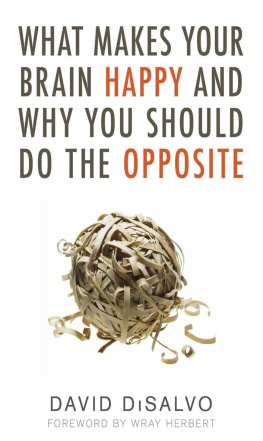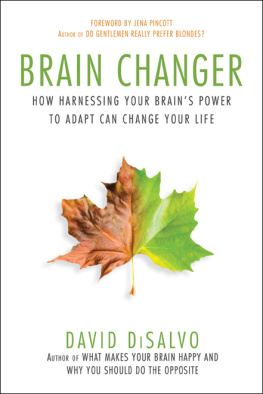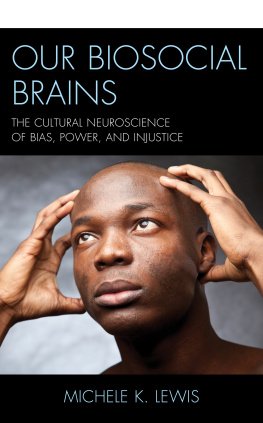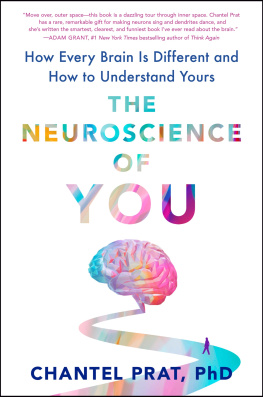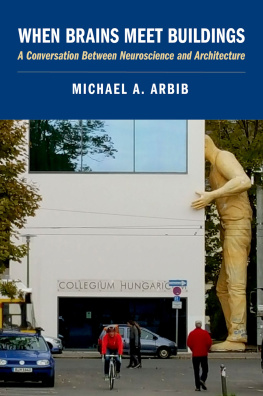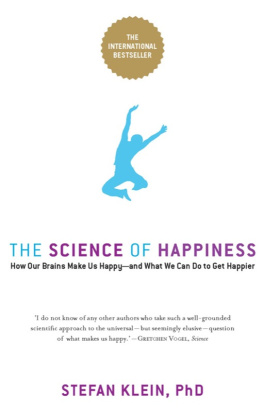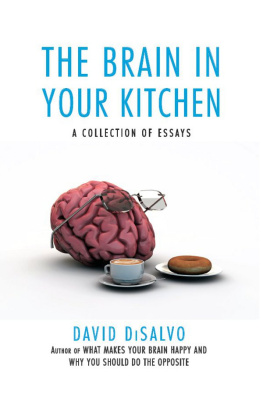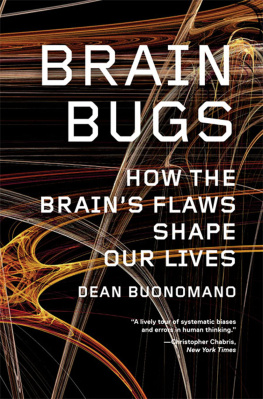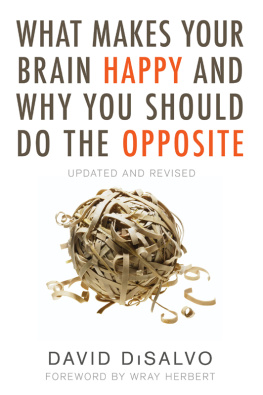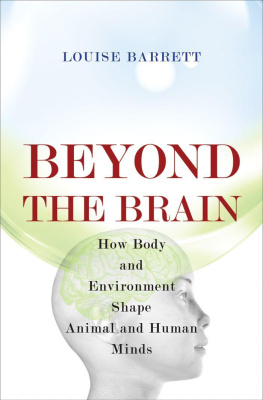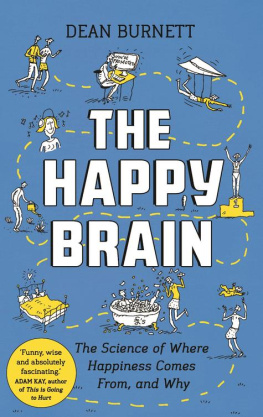Packed full of scientific insights with practical applications to everyday lifea thought-provoking and entertaining page-turner.
Gary Small, MD, UCLA professor of psychiatry and author of The Memory Bible, iBrain, and The Other Side of the Couch: A Psychiatrist Solves His Most Unusual Cases
Reading What Makes Your Brain Happy is like eating intellectual dim sum at your favorite Chinese restaurant. Each morsel is tasty, and you will keep coming back for more.
Bruce Hood, PhD, author of SuperSense: Why We Believe the Unbelievable and director of the Bristol Cognitive Development Centre
DiSalvo takes us on a refreshing voyage into the multitude of ways your brain is busy smacking you around, and provides an antidote to the standard servings of self-help snake oil.
Mark Changizi, PhD, author of Harnessed: How Language and Music Mimicked Nature and Transformed Ape to Man
The chapters in this book are crystal clear and multifaceted, and each transmits a ray of insight about how we think. It's jewelry for the mindful mind.
Phillip Alcabes, PhD, author of Dread: How Fear and Fantasy Have Fueled Epidemics from the Black Plague to the Avian Flu
It's hard to put down this smart, readable discussion of the latest brain science. As always, DiSalvo deftly offers both expert and lay readers news we can use, in context and with style. Read on!
Maggie Jackson, author of Distracted: The Erosion of Attention and the Coming Dark Age
DiSalvo is a genial and enthusiastic guide who makes emerging research in neuroscience, social psychology, cognitive science, and behavioral economics accessible, and even entertaining. But this book is not specifically about research, nor is it really about brains and minds. What it is about is you and me and how science can help with the messy business of trying to live a meaningful, good life. A delightfully illuminating read.
Todd Essig, PhD, training and supervising psychoanalyst, William Alanson White Institute
Every week the media delivers to the public a barrage of psychology and neuroscience findings. They sound fascinating but are untethered from daily life. DiSalvo extracts the practical potential of these discoveries, and in so doing performs a public service that is creative and witty.
J. D. Trout, PhD, author of The Empathy Gap: Building Bridges to the Good Life and the Good Society and professor of philosophy and psychology, Loyola University Chicago
Want to know how all the little ins and outs of your neurochemistry hold you dangling like a puppet on a set of strings? DiSalvo's gleanings from current neuroscience and psychology are entertaining, intriguing, and instructive. And who knows? The more you know, the more control you might gain over how those strings make you dance.
Joseph Carroll, PhD, author of The Literary Animal: Evolution and the Nature of Narrative
DiSalvo's book provides a well-written foray into the fascinating fields of neuroscience and social psychology. It will pique your curiosity and help you understand people in new ways.
Charles H. Elliott, PhD, coauthor of many psychology books, including Overcoming Anxiety for Dummies, Obsessive Compulsive Disorder for Dummies, and Borderline Personality Disorder for Dummies

Published 2011 by Prometheus Books
What Makes Your Brain Happy and Why You Should Do the Opposite. Copyright 2011 by David DiSalvo. All rights reserved. No part of this publication may be reproduced, stored in a retrieval system, or transmitted in any form or by any means, digital, electronic, mechanical, photocopying, recording, or otherwise, or conveyed via the Internet or a website without prior written permission of the publisher, except in the case of brief quotations embodied in critical articles and reviews.
Trademarks: In an effort to acknowledge trademarked names of products mentioned in this work, we have placed or after the product name in the first instance of its use in each chapter. Subsequent mentions of the name within a given chapter appear without the symbol.
Cover image Exactostock/SuperStock
Cover design by Nicole Sommer-Lecht
Inquiries should be addressed to
Prometheus Books
59 John Glenn Drive
Amherst, New York 142282119
VOICE: 7166910133
FAX: 7166910137
WWW.PROMETHEUSBOOKS.COM
15 14 13 12 11 5 4 3 2 1
Library of Congress Cataloging-in-Publication Data
DiSalvo, David, 1970
What makes your brain happy and why you should do the opposite / by David DiSalvo.
p. cm.
Includes bibliographical references and index.
ISBN 9781616144838 (pbk.: alk. paper)
ISBN 9781616144845 (ebook)
1. Happiness. 2. Logic. 3. Desire. 4. Neurosciences. I. Title.
BF575.H27D57 2011
152.4'2dc23
2011028695
Printed in the United States of America on acid-free paper



E arly on in this engaging volume, David DiSalvo tells the story of an attempted drugstore robbery that goes badly. It could have been worsenobody is killedbut two of DiSalvo's coworkers are seriously injured when they take risks way out of proportion to the meager carton of cigarettes that the thieves are after. The drugstore workers aren't reckless people, and they have all the information they need to make more sensibleand less perilousdecisions. Yet they don't. Instead of calculating their personal risk in a rational way, they make rash and senseless choices. Why?
DiSalvo deconstructs the irrational thinking of these two hapless employees, both of whose judgments were skewed by very common cognitive biases. One young man was blinded by an archaic but potent sexist caricature of womanly weaknessa bias that often acts below the level of conscious awareness. The other worker was also blinded, in his case by a well-rehearsed internal script in which he played the hero. This powerful narrative narrowed his view of the situation's many possibilities, some of them far from heroic. Both acted rapidly and automatically, without deliberation, making choices they would later regret.
Stereotypes and scripts are both valuable cognitive tools, rules of thumb that we all use every day to navigate the world. Without access to these tools, and many others like them, we would be indecisive, paralyzed. But these tools are also potential traps if used inappropriately or applied in the wrong situationas DiSalvo's coworkers did in trying to foil this attempted robbery. We all trade in stereotypes and scripts all the time, using them as efficient shortcuts to conserve time and mental energy. But as this anecdote illustrates, they can skew our judgment.
I like this storyand many of the stories that the author narrates throughout the bookbecause of its ordinariness. The villains aren't clever or ruthless, and the well-intentioned workers aren't unusually foolish. But they are foolish in the way that we all are, in our normal everyday decisions and choices. That's why it's so easy to sympathize with their misguided and earnest judgments and actions.
I also like this tale because it makes two very important points about human behavior and about the way we think and write about psychology:
The first is that human psychology is complicated. I have spent much of my professional life trying to make this point, and it's not as obvious as one might think. The challenge of writing about behavioral scienceas opposed to astronomy or immunology or particle physicsis that readers already understand psychology at a very basic level. Everyone has experienced the full range of human emotions, from terror to delight; everyone has been motivated or unmotivated by turns; everyone has exercised self-control and discipline, and failed to. So readers know the territory, the psychic landscape. The challenge for psychological scientists is to uncover another level of scientific understanding that is not obvious, and the challenge for psychology writers is to convince readers that these findings are novel and worth knowing. DiSalvo has a well-earned reputation in the field for rooting his work in life's ordinary details, yet surprising readers with unexpected insights.
Next page
